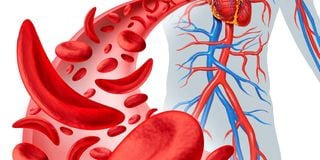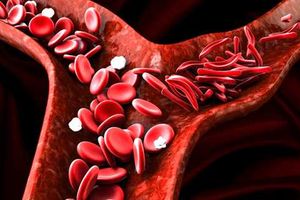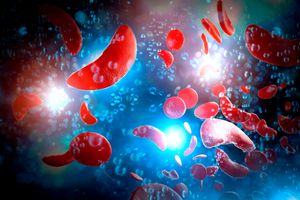Pain as sickle-cell patients fail to get Hydroxyurea drug

A depiction of sickle-cells. The number of capsules to be taken daily depends on a patient’s weight.
A treatment programme for sickle cell patients has been disrupted with public hospitals recording shortage of a key drug.
Patients say the absence of Hydroxyurea (Droxia, Siklos) can lead to a range of consequences that need urgent attention, adding that the shortage has placed an extra burden on families who have to buy it expensively from private chemists.
Ms Sally Achieng said she spends Sh50 per tablet, translating to Sh200 a day for the four capsules.
“I went to a city hospital for my drugs last week but we were told to borrow from fellow patients or buy from a private hospital,” Achieng, who takes two tablets daily, told the Sunday Nation.
The Nairobi resident also has to ensure her baby is placed on the drug to avoid pain.
“One of the hospitals I went to was charging Sh70 per tablet. We request the government to make the drug available for it is not easy to bear the pain,” she said.
Ms Achieng on Friday had pain in the left knee and an attack that saw her rushed to hospital as she had not taken the drug.
Hydroxyurea (Droxia, Siklos) is used to reduce the frequency of painful crises and the need for blood transfusion.
It makes the red blood cells bigger, rounder and more flexible, hence flowing better while delivering oxygen to the body more easily.
“The pain reduces the moment I take the drug. Failing to take it means I have to make several trips to hospital. I honestly don’t have money for that,” she said.
Public Health Principal Secretary, Mary Muthoni told the Sunday Nation the problem would be addressed “as soon as possible”.
“It depends on which hospital one is visiting. With health being devolved, this is purely the role of county governments. I have forwarded the matter to the technical team,” Ms Muthoni said.
Mr Erick Ayeya, the clinical officer who oversees sickle cell care in Homa Bay County, said the region has run out of the drug though a consignment from Moi Teaching and Referral Hospital, (MTRH) Eldoret, is expected soon.
He added that Hydroxyurea (Droxia, Siklos) is not always available at most government hospitals yet it is a key tool in battling the disease.
“Many county governments do not procure the drug. It is only in Bungoma, Homa Bay and MTRH where the drug is subsidised at Sh10 per capsule. It is a collaboration between the counties and Ampath,” he said.
Mr Ayeya added that even with the supply, shortages are experienced because patients flock to Homa Bay from other counties.
In other hospitals and counties, one tablet goes for Sh45 to Sh60.
“The number of the capsules to be taken depends on the weight of the patient. Some even take four daily,” he said.
“This drug has become a game-changer for sickle-cell patients. It has saved countless lives and prevents acute and long-term complications with no serious risks. It just has to be made available and accessible.”
More than 6,000 children are born with sickle-cell in Homa Bay and Kisumu counties every year, accounting for three-quarters of the national population.
Other counties burdened by the illness are Bungoma, Kakamega, Siaya, Nairobi, Mombasa, Taita Taveta, Kilifi, Kwale, Migori, Busia, Vihiga, Kisii, Nyamira, Uasin Gishu and Trans Nzoia.
Homa Bay and Kisumu have set up centres to manage the disease through collaborative deals.
In Kisumu, the drug is dispensed at half the price as it is donated by Novartis.
The World Health Organisation says more than 300,000 babies are born with sickle cell in Sub-Sahara every year.
In Kenya, eighty per cent of those born with the disease die before their fifth birthday.
Many have died at hospital due to lack of blood. Blood transfusion can save many lives but shortages put many sickle-cell patients at risk of death.





